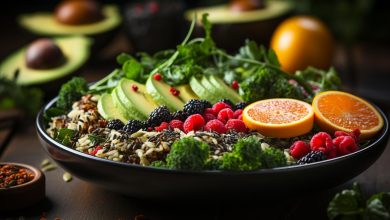Nutrient Timing: When and What to Eat Before and After a Run

Are you a runner looking to optimize your performance? Discover the power of nutrient timing!
This article will guide you on when and what to eat before and after your runs. By understanding the importance of pre-run nutrition, optimal meal timing, and key nutrients to include in your meals, you can fuel your body for success.
Plus, learn effective fueling strategies during your run and post-run recovery nutrition for peak performance.
Get ready to take your running game to the next level!
The Importance of Pre-Run Nutrition

You should focus on consuming a balanced meal with carbohydrates and protein before your run to ensure optimal performance. Pre-run nutrition plays a crucial role in fueling your body and providing the necessary energy for an efficient workout.
It is important to choose pre-run snack options that are easily digestible, rich in carbohydrates, and moderate in protein. Carbohydrates are the primary source of fuel for your muscles during exercise. They provide quick energy and help prevent fatigue. Good pre-run carbohydrate options include whole grain toast with nut butter, oatmeal with fruits, or a banana. These snacks will give you the necessary carbohydrates to power through your run.
In addition to carbohydrates, it is also important to stay hydrated before a run. Dehydration can lead to decreased performance and muscle cramps. Make sure to drink enough water or electrolyte-rich beverages before heading out for your run.
To optimize your pre-run nutrition, aim to eat your meal or snack about 1-2 hours before running. This allows enough time for digestion so that you don’t feel heavy or uncomfortable during exercise. It also ensures that the nutrients from your pre-run meal are readily available for energy production.
Optimal Pre-Run Meal Timing

Start your run off strong by ensuring you’ve had a well-timed meal beforehand. The timing of your pre-run meal plays a crucial role in optimizing your performance and fueling your body for the physical demands of running. Here are four reasons why getting the timing right can benefit you:
1. Energy boost: Consuming a balanced meal with carbohydrates, protein, and healthy fats about 1-2 hours before your run provides the necessary energy to power through your workout.
2. Improved digestion: Allowing enough time for digestion before running can help prevent discomfort such as cramping or bloating during exercise.
3. Enhanced nutrient absorption: Eating a pre-run meal ensures that essential nutrients are available for absorption, providing the building blocks necessary for muscle repair and recovery.
4. Sustained endurance: Properly timed meals help maintain stable blood sugar levels, preventing energy crashes during long runs and enhancing overall endurance.
To optimize your pre-run meals further, it’s important to include key nutrients like carbohydrates for energy, lean proteins to support muscle repair, and healthy fats for sustained fuel. By incorporating these nutrients into your meals before heading out on a run, you’ll be setting yourself up for success on the road or trail ahead.
Transitioning into the next section about ‘key nutrients to include in pre-run meals’, let’s explore how each of these components contributes to optimal performance and recovery.
Key Nutrients to Include in Pre-Run Meals

Transitioning into the next section, let’s explore how incorporating key nutrients into your pre-run meals contributes to optimal performance and recovery. Proper pre-run fueling is essential for providing your body with the energy it needs to perform at its best. By carefully selecting the right combination of nutrients, you can enhance your endurance, speed up recovery, and prevent muscle breakdown.
To help you understand the importance of meal composition before a run, here’s a table outlining key nutrients and their benefits:
| Nutrient | Benefits | Food Sources |
|---|---|---|
| Carbohydrates | Main source of energy | Whole grains, fruits, vegetables |
| Protein | Promotes muscle repair | Lean meats, poultry, beans |
| Healthy fats | Sustained energy release | Avocadoes, nuts |
| Electrolytes | Hydration balance | Bananas, coconut water |
| Antioxidants | Reduces oxidative stress | Berries, leafy greens |
By including these nutrient-rich foods in your pre-run meals, you provide your body with the necessary fuel and support for optimal performance. Aim for a well-balanced meal that includes carbohydrates for immediate energy release and protein to aid in muscle recovery. Don’t forget to hydrate properly by consuming fluids that contain electrolytes. Additionally, incorporating antioxidant-rich foods can help reduce inflammation and protect against exercise-induced damage.
Remember that everyone’s nutritional needs may vary based on factors such as training intensity and duration. Experiment with different combinations of these key nutrients to find what works best for you. Happy running!
Fueling Strategies During a Run

During your run, it’s important to maintain proper fueling strategies to sustain energy levels and optimize performance. Here are four key fueling strategies to keep in mind:
1. Hydration techniques: Staying hydrated during your run is crucial for maintaining energy levels and preventing dehydration. Make sure to drink water before, during, and after your run. If you’re running for longer than an hour or sweating excessively, consider electrolyte-rich sports drinks to replenish lost minerals.
2. Energy gels: Energy gels are a convenient source of carbohydrates that can provide a quick boost of energy during long runs or intense workouts. They are easily digestible and can help delay fatigue, especially when consumed with water. Experiment with different flavors and brands during training to find what works best for you.
3. Timing: Consuming small amounts of fuel at regular intervals throughout your run can help ensure a steady supply of energy without overwhelming your digestive system. Aim to consume 30-60 grams of carbohydrates per hour, depending on the duration and intensity of your run.
4. Practice makes perfect: It’s essential to practice fueling strategies during training runs to figure out what works best for you personally. Everyone is different, so experiment with different hydration techniques and energy gel consumption timings until you find the right combination that optimizes your performance.
As you finish up your run and start thinking about recovery, it’s important to consider post-run nutrition in order to properly refuel and aid in muscle repair.
Post-Run Recovery Nutrition

To properly refuel and aid in muscle repair after your run, it’s important to consider incorporating post-run recovery nutrition into your routine. After a run, your muscles are depleted of glycogen and need replenishment. Consuming the right nutrients can help speed up recovery and enhance your performance for future workouts.
One effective way to kickstart your recovery is by consuming recovery drinks. These beverages are specifically designed to provide the necessary carbohydrates, protein, and electrolytes that your body needs after exercise. Carbohydrates replenish glycogen stores, while protein helps repair and rebuild damaged muscle fibers. Electrolytes such as sodium and potassium help restore fluid balance and prevent dehydration.
Studies have shown that consuming a combination of carbohydrates and protein within 30 minutes to an hour after exercise can optimize muscle recovery. Aim for a ratio of approximately 3:1 or 4:1 of carbohydrates to protein for optimal results.
Some examples of post-run recovery drinks include chocolate milk, sports drinks with added protein, or homemade smoothies with fruits, yogurt, and a scoop of whey protein powder.
Conclusion
To sum it up, you now know the significance of fueling your body before and after a run.
By timing your pre-run meal correctly and including key nutrients like carbohydrates and protein, you can optimize your performance.
During your run, remember to fuel with easily digestible snacks to keep your energy levels up.
And once you’re done, prioritize post-run recovery nutrition to replenish lost nutrients and aid in muscle repair.
So go ahead, follow these tips religiously and become an absolute running machine!






